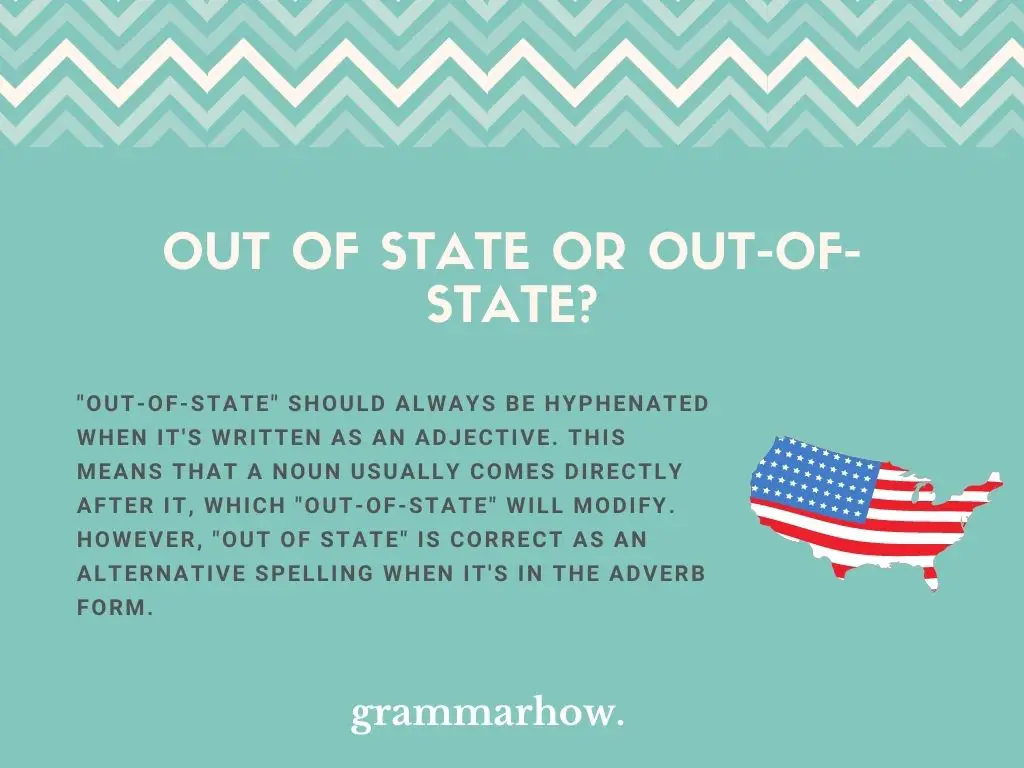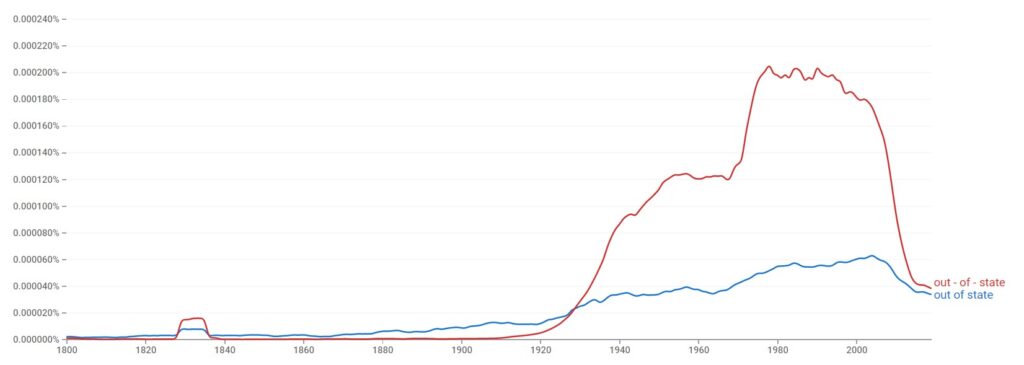“Out of state” works well in many cases to show that something happens outside of a particular state. However, we should learn whether it’s a hyphenated form or whether we can write it as one or two words. This article will help you answer that.
Out of state vs. Out-of-state
“Out-of-state” should always be hyphenated when it’s written as an adjective. This means that a noun usually comes directly after it, which “out-of-state” will modify. However, “out of state” is correct as an alternative spelling when it’s in the adverb form.

According to Google Ngram Viewer, “out-of-state” and “out of state” are almost identical in usage numbers. That’s because it’s common to use both the adjective and adverbial forms with little key differences between them.

In The Cambridge Dictionary and The Oxford Dictionary, “out-of-state” is officially recognized as the adjective form of the phrase. However, the adverb form is listed as both “out-of-state” and “out of state.” Both dictionaries offer both options to use.
In case you’re not entirely certain what the differences between the two forms are, you can refer to the following:
- Adjective: I have met some of the out-of-state students already.
- Adverb: A lot of the problems happen out of state/out-of-state, which is why we don’t know much more about them.
Out of state
“Out of state” is only correct as an adverbial form. We use it almost as often as the alternative spelling where it is hyphenated, so it’s based mostly on personal preference whether you like the hyphens or would prefer to keep the words separated.
Typically, “out of state” comes up as an adverb quite a lot. You’ll find that it’s common when people want to talk about things that happen outside of a particular state.
Hopefully, these examples will help to clear things up:
- I like to get my wine delivered from out of state. They’re always tastier that way.
- We have many students from out of state. You should talk to them to find out more about their upbringing.
- Whatever you learned from out of state, it’s time for you to discuss the strategies with us.
- I don’t like traveling out of state much. I feel like I get lost too easily!
“Out of state” works as an adverb when we’re talking about leaving a state or sourcing something from another state or place. However, if there is ever a mention of a noun, we should hyphenate the phrase.
Out-of-state
“Out-of-state” is correct in its hyphenated form as both an adjective and an adverb. There are no exceptions with the adjective form, as the hyphens are the only acceptable choice. However, it’s up to you whether to use the hyphens when writing the adverbial form.
AP Stylebook guidelines teach us all we need to know about hyphenated adjectives. Typically, if a noun comes after a group of words, but all those words work to modify the noun, we should hyphenate them to indicate that they are modifiers.
And remember, it’s not just the adjective form that we can use:
- Adjective: The out-of-state wines are the best ones.
- Adverb: I’m from out-of-state.
Here are a few more examples of both cases:
- You should find some of them from out-of-state. You might be surprised by the quality.
- The out-of-state students have all decided to sign up next week.
- We can’t find any of the out-of-state passports that we had stored here.
- We’re heading out-of-state. Would you like to come with us?
The hyphenated form is generally more common as an adjective. However, you may also use it in the adverbial form if you like the way it feels in your writing.
Is “Of-State” Capitalized In The Word “Out-Of-State”?
There is no need to capitalize “of-state” in “out-of-state.” The hyphenated form is not a proper noun, so it’s unlikely that you’ll want to capitalize it. However, if you write it in a title, it’s probably wise to capitalize each part of the word.
Even though hyphens work to group words into one, we can still treat the individual parts as separate words. Therefore, it might be useful to capitalize all the words in a hyphenated form if every other word in the title is capitalized as well.

Martin holds a Master’s degree in Finance and International Business. He has six years of experience in professional communication with clients, executives, and colleagues. Furthermore, he has teaching experience from Aarhus University. Martin has been featured as an expert in communication and teaching on Forbes and Shopify. Read more about Martin here.
